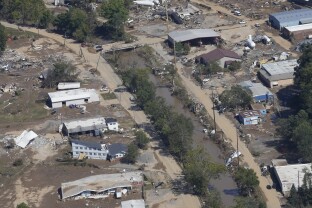In Asheville, North Carolina, the Democratic Party’s robust campaign infrastructure has completely ceased operations.
The litany of canvassing dates and events originally planned for early October in the Asheville area are canceled, with no anticipated date for their return. All of the county party’s social media and other advertising plans are suspended indefinitely.
Asheville is the densest population center in North Carolina to face destructive flooding, though the same crisis — and now the same campaigning pause — has hit the counties surrounding it. Calls from NOTUS to many party headquarters (including the Republican headquarters in Buncombe County) and county election offices on Friday went straight to voicemail or dial tone errors. Five county election offices remain closed as of Friday.
Kamala Harris is scheduled to visit western North Carolina on Saturday. But aside from Buncombe County Democratic Party Chair Kathie Kline, the Democratic Party’s volunteers in Asheville have dropped their efforts for Harris. Many of the usual Harris volunteers are instead focused on relief, with people still missing, water infrastructure weeks from full repair and many schools and roads still closed.
Kline lost power and water in the storm too. She left the city Sunday morning to work out of a hotel in Charlotte, North Carolina, the nearest place with the critical cell service and internet needed to keep a line to the state Democratic Party and the Harris campaign. Her husband, a physician, stayed behind to help with the recovery efforts.
Kline told NOTUS that she’s pledging the party’s volunteers to staff the county office once early voting begins on Oct. 17, even if there is still no water. But beyond that, the remaining campaign plans are in flux.
“We are one of the most effective counties when it comes to getting out the Democratic Party vote, and that was why I was so alarmed initially,” she said. “Because if we don’t have a good turnout in Buncombe County, I was not sure we’re going to be able to turn North Carolina blue this year.”
Recovery efforts have made Kline more optimistic that Democrats will unite together to vote. She said that now is not the time for people to be campaigning.
Asheville has long been a Democratic stronghold in the state, while the areas surrounding it vote reliably Republican. North Carolina was a virtual tie in the polling for the presidential election before the storm, and so operatives on both sides of the aisle are now trying to determine whether the devastation from its aftermath will affect turnout and voting in any particular direction.
About 1.6 times the number of registered Republicans than Democrats live in counties with a federal disaster declaration in North Carolina, but Democrats and Republicans have cautioned against drawing conclusions from those numbers. It’s impossible to know whether people will feel motivated to turn out if they’ve been hit by the disaster.
One state-level Republican campaign strategist noted that the damage in each county is very different, and some counties were affected only in part. That same strategist said they will not trust any polls coming out of the state for the next several weeks, echoing ongoing pollster concerns that it will be difficult to measure the storm’s effects.
As for voting itself, many early voting sites have been damaged or made inaccessible by the storm. In Henderson County, a Republican stronghold just south of Buncombe, the roads to many sites are still inaccessible. And many voting facilities that are open are being used for disaster response.
“We’re waiting on some guidance from the legislature,” Aaron Troutman, an election official with Henderson County’s election office, told NOTUS. The legislature will meet this coming week to discuss emergency appropriations related to the storm damage and is currently considering plans to assist the state board of elections.
The Republican campaign strategist told NOTUS that legislators are discussing bills that could allow for early voting sites to be moved or make it easier to staff new or different voting sites. In Mitchell County, for example, one of the two early voting sites is currently located in Spruce Pine, a town that has been almost completely destroyed and is now hard to access.
North Carolina House Democratic Minority Leader Robert Reives said that he envisions elections assistance will be part of a larger emergency appropriations package currently under discussion. “I have a lot of faith in our state board of elections, so I hope most of what we do is supplanting their needs,” he said.
The board of elections, which has already hosted one emergency meeting to create some leeway for the counties affected by the storm, has scheduled another such meeting for Monday morning.
—
Anna Kramer is a reporter at NOTUS.
Sign in
Log into your free account with your email. Don’t have one?
Check your email for a one-time code.
We sent a 4-digit code to . Enter the pin to confirm your account.
New code will be available in 1:00
Let’s try this again.
We encountered an error with the passcode sent to . Please reenter your email.


